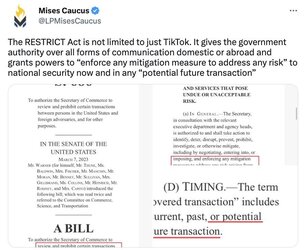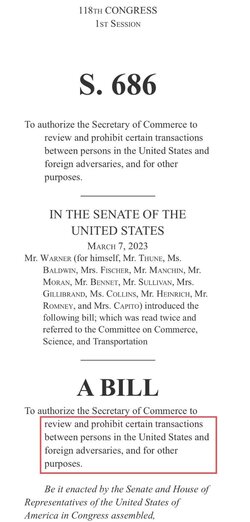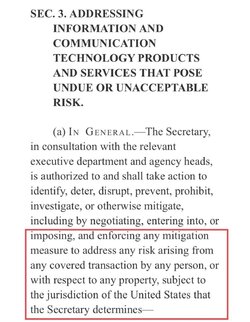Freedom of speech and association include the right to choose one’s communication technologies. Politicians shouldn’t be able to tell you what to say, where to say it, or who to say it to.
So we are troubled by growing demands in the United States for restrictions on TikTok, a technology that many people have chosen to exchange information with others around the world. Before taking such a drastic step, the government must come forward with specific evidence showing, at the very least, a real problem and a narrowly tailored solution. So far, the government hasn’t done so.
Nearly all social media platforms and other online businesses collect a lot of personal data from their users. TikTok raises special concerns, given the surveillance and censorship practices of its home country, China. Still, the best solution to these problems is not to single-out one business or country for a ban. Rather, we must enact comprehensive consumer data privacy legislation. By reducing the massive stores of personal data collected by all businesses, TikTok included, we will reduce opportunities for all governments, China included, to buy or steal this data.
Many people choose TikTok
TikTok is a social media platform that hosts
short videos. It is owned by
ByteDance, a company headquartered in China. It has
100 million monthly users in the United States, and
a billion worldwide. According to Pew,
67% of U.S. teenagers use Tiktok, and
10% of U.S. adults regularly get news there. Many users choose TikTok over its competitors because of its unique content recommendation system; to such users, social media platforms are not fungible.
TikTok videos address topics “
as diverse as human thought.”
Political satirists mock politicians.
Political candidates connect with voters.
Activists promote social justice. Many users create and enjoy entertainment like
dance videos.
Problems with TikTok bans
If the government banned TikTok, it would undermine the free speech and association of millions of users. It would also intrude on TikTok’s interest in disseminating its users’ videos—just as bookstores have a right to
sell books written by others, and newspapers have a right to
publish someone else’s opinion.
In a First Amendment challenge, courts would apply at least “intermediate scrutiny” to a TikTok ban and, depending upon the government’s intentions and the ban’s language, might apply “strict scrutiny.” Either way, the government would have to prove that its ban is “
narrowly tailored” to national security or other concerns. At the very least, the government “must demonstrate that the recited harms are
real, not merely conjectural.” It also must show a “
close fit” between the ban and the government’s goals, and that it did not “burden substantially more speech than is necessary.” So far, the government has not publicly presented any specific information showing it can meet this high bar.
Any TikTok ban must also contend with a federal statute that protects the free flow of information in and out of the United States: the
Berman Amendments. In 1977, Congress enacted the International Emergency Economic Powers Act (
IEEPA), which limited presidential power to restrict trade with foreign nations. In 1988 and 1994, Congress amended IEEPA to further limit presidential power. Most importantly, the President cannot “regulate or prohibit, directly or
indirectly,” either “any…personal communication, which does not involve a transfer of anything of value,” or the import or export of “any information or informational materials.” Banning TikTok would be an indirect way of prohibiting information from crossing borders. Rep. Berman explained:
The fact that we disapprove of the government of a particular country ought not to inhibit our dialog with the people who suffer under those governments…We are
strongest and most influential when we embody the freedoms to which others aspire.
A TikTok ban would cause further harms. It would undermine information security if, for example, legacy TikTok users could not receive
updates to patch vulnerabilities. A ban would
further entrench the social media market share of a
small number of massive companies. One of these companies, Meta,
paid a consulting firm to orchestrate a nationwide campaign seeking to turn the public against TikTok. After India banned TikTok in 2020, following a border dispute with China, many Indian users
shifted to Instagram Reels and YouTube Shorts. Finally, a ban would undermine our moral authority to criticize censorship abroad.
The 2020 TikTok ban
In 2020, former President Trump issued
Executive Orders banning TikTok and
WeChat, another Chinese-based communications platform. EFF filed two
amicus briefs in support of challenges to these bans, and published
three blog posts criticizing them.
A federal magistrate judge granted a
preliminary injunction against the WeChat ban, based on the plaintiff’s likelihood of success on their First Amendment claim. The court reasoned that the government had presented “scant little evidence,” and that the ban “burden[ed] substantially more speech than is necessary.”
In 2021, President Biden
revoked these bans.
The DATA Act
This year, Rep. McCaul (R-TX) filed the federal “
DATA Act” (
H.R. 1153). A House committee
approved it on a party-line vote.
The bill requires executive officials to ban U.S. persons from engaging in “any transaction” with someone who “may transfer” certain personal data to any foreign person that is “subject to the influence of China,” or to that nation’s jurisdiction, direct or indirect control, or ownership. The bill also requires a ban on property transactions by any foreign person that operates a connected software application that is “subject to the influence of China,” and that “may be facilitating or contributing” to China’s surveillance or censorship. The President would have to sanction TikTok if it met either criterion.
It is doubtful this ban could survive First Amendment review, as the government has disclosed no specific information that shows narrow tailoring. Moreover, key terms are unconstitutionally vague, as the ACLU explained in its
opposition letter.
The bill would weaken the Berman Amendments: that safeguard would no longer apply to the import or export of personal data. But many communication technologies, not just TikTok, move personal data across national borders. And many nations, not just China, threaten user privacy. While the current panic concerns one app based in one country, this weakening of the Berman Amendments will have much broader consequences.
The Restrict Act
Also this year, Sen. Warner (D-VA) and Sen. Thune (R-SD), along with ten other Senators, filed the federal “
RESTRICT Act.” The White House
endorsed it. It would authorize the executive branch to block “transactions” and “holdings” of “foreign adversaries” that involve “information and communication technology” and create “undue or unacceptable risk” to national security and more.
Two differences between the bills bear emphasis. First, while the DATA Act requires executive actions, the RESTRICT Act authorizes them following a review process. Second, while the DATA Act applies only to China, the RESTRICT Act applies to six “foreign adversaries” (China, Cuba, Iran, North Korea, Russia, and Venezuela), and can be expanded to other countries.
The RESTRICT Act sets the stage for a TikTok ban. But the government has publicly disclosed no specific information that shows narrow tailoring. Worse, three provisions of the bill make such transparency less likely. First, the executive branch need not publicly explain a ban if doing so is not “practicable” and “consistent with … national security and law enforcement interests.” Second, any lawsuit challenging a ban would be constrained in scope and the amount of discovery. Third, while Congress can override the designation or de-designation of a “foreign adversary,” it has no other role.
Coercing ByteDance to sell TikTok
The Biden administration has demanded that ByteDance
sell TikTok or face a possible U.S. ban, according to the company. But the fundamental question remains: can the government show that banning TikTok is narrowly tailored? If not, the government cannot use the threat of unlawful censorship as the cudgel to coerce a business to sell its property.
The context here is review by the Committee on Foreign Investment in the United States (
CFIUS) of ByteDance’s ownership of TikTok. The CFIUS is a federal entity that reviews, and in the name of national security can
block, certain acquisitions of U.S. businesses by foreign entities. In 2017, ByteDance
bought TikTok (then called Musical.ly), and in 2019, CFIUS began
investigating the purchase.
In response, TikTok has committed to a plan called “
Project Texas.” The company would spend $1.5 billion on systems, overseen by CFIUS, to block data flow from TikTok to ByteDance and Chinese officials. Whether a TikTok ban is narrowly tailored would turn, in part, on whether Project Texas could address the government’s concerns without the extraordinary step of banning a communications platform.
Excluding TikTok from government-owned Wi-Fi
Some public universities and colleges have
excluded TikTok from their Wi-Fi systems.
This is disappointing. Students use TikTok to gather information from, and express themselves to, audiences around the world. Professors use it as a
teaching tool, for example, in classes on media and culture.
College-based news media write stories about TikTok and use that platform to disseminate their stories. Restrictions on each pose First Amendment problems.
These exclusions will often be ineffective, because TikTok users can switch their devices from Wi-Fi to cellular. This further reduces the ability of a ban to withstand First Amendment scrutiny. Moreover, universities are teaching students the wrong lesson concerning how to make fact-based decisions about how to disseminate knowledge.
Excluding TikTok from government-owned devices
More than half of U.S. states have
excluded TikTok from government-owned devices provided to government employees. Some state
bills would do the same.
Government officials may be at greater risk of espionage than members of the general public, so there may be heightened concerns about the installation of TikTok on government devices. Also, government has greater prerogatives to manage its own assets and workplaces than those in the private sector. Still, infosec policies targeting just one technology or nation are probably not the best way to protect the government’s employees and programs.
The real solution: consumer data privacy legislation
There are legitimate data privacy concerns about all social media platforms, including but not limited TikTok. They all harvest and monetize our personal data and incentivize other online businesses to do the same. The result is that detailed information about us is widely available to purchasers, thieves, and government subpoenas.
That’s why EFF supports comprehensive consumer data privacy legislation.
Consider
location data brokers, for example. Our phone apps collect detailed records of our physical movements, without our knowledge or genuine consent. The app developers sell it to data brokers, who in turn sell it to anyone who will pay for it. An
anti-gay group bought it to identify gay priests. An
election denier bought it to try to prove voting fraud. One broker sold data on who had visited
reproductive health facilities.
If China wanted to buy this data, it could probably find a way to do so. Banning TikTok from operating here probably would not stop China from acquiring the location data of people here. The better approach is to limit how
all businesses here collect personal data. This would reduce the supply of data that any adversary might obtain.









